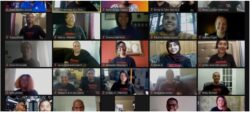


Remote learning continues to transcend the classroom into programs for students of all ages, creating new opportunities, regardless of geography. One of those programs, NOMA (National Association of Minority Architects) Detroit once again held its Project Pipeline architecture camps virtually this past summer, via Zoom.
NOMA created Project Pipeline to help increase the number of minority and under-represented students exposed to architecture and the built environment. Inspired after hearing about Project Pipeline at a national NOMA conference, architect Bryan Cook brought the program to Michigan, starting with Grand Rapids in 2013, expanding to Detroit in 2016, and, beginning in 2018, to Flint. In 2020 and 2021, due to COVID, the camps were held virtually, which opened participation to students throughout Michigan, regardless of location. The program has been so successful that it has been a MAF grant recipient for multiple years running.
This year, NOMA Detroit collaborated regionally with NOMA chapters in Illinois, Cleveland, and Kansas City. A total of 35 students from across the Midwest participated. While most campers already had computers or other technology devices due to a full year of remote classroom learning, NOMA Detroit did provide two tablets to students so they could participate in this year’s camp. In addition, several architects conducted ‘Lunch and Learn’ presentations for students about the profession, and what it means to be an architect.

“Our participants really enjoyed themselves and were excited about doing the work,” said Bryan Cook, AIA, NOMA, MAF Board Member and founder of NOMA Detroit’s Project Pipeline Camp program. “Since most students are new to our camp program, it takes a couple of days for them to get engaged, but once they do, the collaboration and interest clicks. That’s true whether our camps are in person or virtual.”
Bryan said the goal is to get back to in-person local camps next year, with a virtual component at the regional and national levels. “After seeing how well the virtual format works and how many students we can reach, NOMA has decided there will always be a national virtual camp component, likely conducted on a regional basis to accommodate time differences.”
He continues, “However, many students have virtual fatigue, and we miss interacting with them in person. We also want to offer a tangible hands-on experience; we anticipate that most work will be a hybrid in the future, so having more direct experiences will be an important part of their learning experience, whether they become architects or not.” Bryan envisions going back to in-person camps mid-summer, with a virtual camp offered right before school starts. “That way, students that wanted to join us for the in-person camp but could not for whatever reason still have the opportunity to participate.”
Bryan stated that NOMA Detroit is finding more success with the camps over the years, not just in the growth of the program, but the programs’ impact on students. “We are exposing students to careers in architecture, and helping to expand their interests and their potential,” he said, “One of our first campers earned her Bachelor’s degree in Architectural Engineering and now works in Atlanta. Another former camper is in his senior year of architecture school. One student had an interest in photography, so I connected him with a NOMA member in Chicago. The student is now taking photos for that member, even though he is still in high school.”
This past summer marked the 7th year of the program, with a total of nine camps offered. Bryan says that one of the reasons the camps have grown is due to having a growing stable of volunteers over the years. “I now have a team across the state that helps to carry out the camps, which is a far cry from the early days when we were cobbling the program together,” he said. “It has been gratifying for me personally to see how much the program has grown and the impact it has created.”